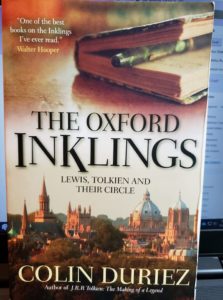
Four years ago I read The Oxford Inklings and posted a review of it. I put this book on the shelf and forgot about it. Forgot that I even had read it, though in the back of my mind I knew I had that book somewhere in my library.
Lately, with my interest in C.S. Lewis enhanced—not that I ever lot interest in him, but from time to time it bubbles to the top of my thoughts and I have to read a book by or about him. Well, after having trouble a while back trying to find something from a Lewis book to go into Acts Of Faith, I realized I needed to consolidate my Lewis books into one place. As I was doing that, almost accidentally I saw The Oxford Inklings hiding in a place I never would have expected it. I looked at it and couldn’t tell if it had ever been read. So I took it up to the sun room and decided I would read it right away.
I remembered a story late in the book, or thought I did. If I get to that part and that story is in there I would know I had indeed read this. Rather than look ahead and try to find that, I decided to just read it straight through and wait until I came.
As I read the book, it seemed new to me. Although I thought I had read it before, reading it now I felt like it was a new book. Had I read it or not? I found it gave me good information. I was about to say no, I hadn’t read it before. As I got close to the end, it began to feel familiar.
At last I came to the period that described Lewis’ declining health, and there was the scene I remembered. Yes, I had read it. Obviously I hadn’t retained it as much as I should have.
I see I gave the book 5 stars before. I stand by that. It does a good job of describing the Inklings and how the group revolved around Lewis more than the others. Members came and went. The three with the most time in the group were Lewis, J.R.R. Tolkien, and Lewis’ brother Warren. Others were there for a few years, or for a longer time but not attending each time they met. A few didn’t write and were there just to critique.

Their goal was to make their writing better. They read works and received criticism on the spot. Back then easy means of printing and copying weren’t available, so their criticism was through listening and commenting. How different it is now. Our writing group, Scribblers and Scribes of Bella Vista, has the advantage of receiving works ahead of time and taking time to read and make comments in writing. We also read and comment at our monthly meetings (soon to be twice a month), but typically have copies of what others are reading.
But, I must go back to the book and close. If you’re interested in C.S. Lewis, J.R.R. Tolkien, their books, their circles, how writers go about their business, this is an excellent read. I highly recommend it—again.